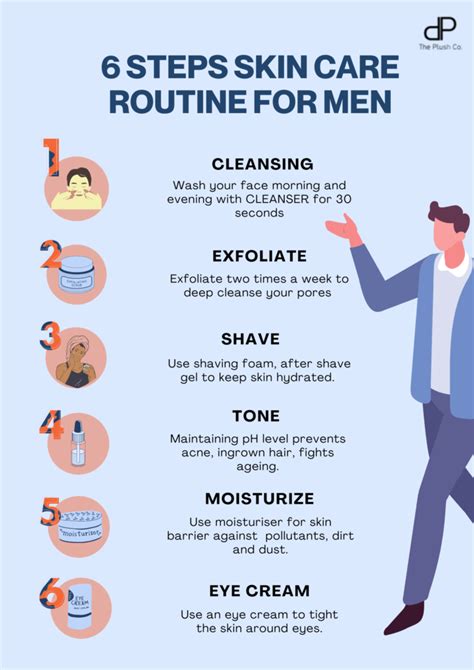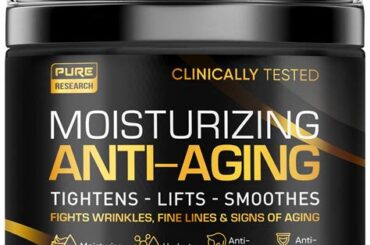When it comes to skincare, it’s not just a concern for women. Men deserve to have healthy, glowing skin too. In fact, creating a skincare routine specifically tailored to men’s needs can make a significant difference in not only how their skin looks, but also how it feels. In this blog post, we will discuss the importance of establishing a skincare routine, as well as provide tips on identifying your skin type and choosing the right products. We’ll delve into the crucial steps of cleansing, exfoliating, moisturizing, and protecting your skin from harmful UV rays. Additionally, we’ll explore ways to address specific skin concerns and incorporate anti-aging products into your routine. Understanding the benefits of serums and the importance of nighttime skincare will also be covered. By the end of this post, you’ll have all the necessary information to create the perfect skincare routine for yourself. So, gentlemen, get ready to embark on a journey to healthier, more radiant skin.
The Importance of a Skincare Routine
Having a skincare routine is essential for maintaining healthy and radiant skin. It not only helps in addressing specific skin concerns but also plays a crucial role in preventing future issues. A proper skincare routine can help in keeping your skin clean, hydrated, and protected from environmental stressors.
Establishing a consistent skincare routine can help in maintaining the skin’s natural barrier, which is important for keeping toxins and pollutants out. Additionally, it aids in preventing early signs of aging, such as wrinkles and fine lines, by promoting skin elasticity and firmness.
Moreover, a skincare routine promotes self-care and can be a relaxing and enjoyable part of your daily routine. It allows you to take a few moments for yourself while pampering your skin, which can have a positive impact on your overall well-being.
In conclusion, having a skincare routine is not only about addressing skin issues, but it is also about caring for yourself. It is an investment in your skin’s health and can help in maintaining a youthful and glowing complexion for years to come.
Identifying Your Skin Type
Identifying your skin type is the first step to creating an effective skincare routine. Understanding whether your skin is oily, dry, combination, or sensitive will help you choose the right products and treatments to achieve healthy and radiant skin.
One way to determine your skin type is to simply observe how your skin feels throughout the day. If you often experience tightness and flakiness, you likely have dry skin. On the other hand, if your skin looks shiny and feels greasy, you probably have oily skin. If you have areas of both dryness and oiliness, you may have combination skin. And if your skin easily becomes red, itchy, or irritated, you likely have sensitive skin.
Another method to identify your skin type is to perform a simple skin test. This involves thoroughly cleansing your face, patting it dry, and then waiting 30 minutes. After this time has passed, observe how your skin looks and feels. If it feels tight and looks flaky, you have dry skin. If it appears shiny and feels slick, you have oily skin. If it feels comfortable with no excessive oil or dryness, you have normal skin. And if it feels irritated or has red patches, you have sensitive skin.
Once you have determined your skin type, you can then tailor your skincare regimen to address your specific skin concerns and achieve the best possible results.
Choosing the Right Cleanser
When it comes to choosing the right cleanser for your skincare routine, it’s important to consider your skin type and specific concerns. Whether you have dry, oily, or sensitive skin, selecting the right cleanser can make a significant difference in the overall health and appearance of your skin.
For those with dry skin, it’s best to opt for a gentle, hydrating cleanser that won’t strip away natural oils. Look for ingredients like hyaluronic acid and ceramides to help retain moisture and improve skin barrier function.
On the other hand, individuals with oily or acne-prone skin may benefit from a foaming or salicylic acid-based cleanser to help control excess oil production and prevent breakouts. These cleansers can help to unclog pores and remove impurities without over-drying the skin.
For sensitive skin, it’s important to choose a fragrance-free and hypoallergenic cleanser that is specifically formulated to minimize irritation. Look for ingredients like aloe vera and chamomile to soothe and calm the skin.
Exfoliation: Removing Dead Skin Cells
Exfoliation is a crucial step in any skincare routine, as it helps to remove dead skin cells from the surface of the skin. By getting rid of these dead cells, exfoliation can reveal the fresh, healthy skin underneath, leaving your complexion looking brighter and more radiant.
There are two main types of exfoliation: physical and chemical. Physical exfoliation involves using a scrub or exfoliating tool to manually slough off dead skin cells, while chemical exfoliation involves using acids or enzymes to dissolve the bonds holding dead skin cells in place. Both methods can be effective, but it’s important to choose the right exfoliant for your skin type and concerns.
When it comes to frequency, it’s essential to find a balance. Over-exfoliating can lead to irritation and inflammation, while under-exfoliating can result in dull, congested skin. Most experts recommend exfoliating 1-3 times a week, depending on your skin type and the exfoliation method you choose.
Overall, exfoliation is a vital step in any skincare routine, helping to keep your skin looking fresh, smooth, and glowing. Just be sure to choose the right exfoliant for your skin type, and to exfoliate in moderation to avoid any irritation.
Moisturizing: Hydrating Your Skin
One of the most important steps in a skincare routine is moisturizing. This step is essential for keeping your skin hydrated and healthy. Using a moisturizer helps to prevent water loss from the skin and maintain its natural moisture balance. It also helps to protect your skin from environmental damage and improve its overall texture and tone.
When choosing a moisturizer, it’s important to consider your skin type. If you have oily skin, look for a lightweight, oil-free moisturizer. For dry skin, opt for a richer, creamier formula. And if you have sensitive skin, choose a gentle, hypoallergenic moisturizer. There are also moisturizers specifically designed for acne-prone or aging skin, so be sure to find one that suits your specific needs.
It’s recommended to apply moisturizer twice a day, in the morning and evening, after cleansing and toning your skin. For the best results, use a moisturizer with SPF during the day to protect your skin from harmful UV rays. And don’t forget to apply a thicker, more hydrating night cream before you go to bed to help repair and rejuvenate your skin while you sleep.
Incorporating moisturizing into your skincare routine is crucial for maintaining healthy, hydrated skin. By finding the right moisturizer for your skin type and using it consistently, you can help keep your skin looking and feeling its best.
Sun Protection: Shielding from Harmful UV Rays
Many people underestimate the importance of sun protection when it comes to skincare. However, shielding your skin from harmful UV rays is crucial in preventing premature aging, sunburn, and even skin cancer. The sun’s UV rays can cause irreversible damage to the skin, making it essential to incorporate sun protection into your daily skincare routine.
When choosing a sunscreen, it’s important to look for a broad-spectrum formula, which means it protects against both UVA and UVB rays. Additionally, opt for a sunscreen with a high SPF (Sun Protection Factor) to ensure maximum protection. Remember to reapply sunscreen every two hours, especially if you’re spending the day outdoors.
In addition to sunscreen, it’s also helpful to seek shade during peak sun hours, typically between 10 AM and 4 PM. Wearing protective clothing, such as wide-brimmed hats and sunglasses, can also provide added protection from UV rays.
By incorporating sun protection into your skincare routine, you can effectively shield your skin from the harmful effects of UV rays, keeping it healthy and youthful for years to come.
Treating Specific Skin Concerns
Treating specific skin concerns can be a challenging task, especially if you do not know your skin type. Whether you have acne, hyperpigmentation, rosacea, or any other skin condition, it is crucial to identify the issue and choose the right products to address it. Consulting with a dermatologist can help you determine the best course of action for treating your specific skin concern.
Once you have identified your specific skin concern, it is important to look for products that are targeted towards addressing that particular issue. For example, if you have acne-prone skin, you may want to look for products containing salicylic acid or benzoyl peroxide to help combat breakouts.
It is also important to be patient when treating specific skin concerns. Results may not be immediate, and it may take some time to see improvements. Consistency is key, so it is important to stick to your skincare routine and give the products time to work.
In addition to using targeted products, it is important to take a holistic approach to treating specific skin concerns. This may include making lifestyle changes such as adjusting your diet, managing stress, and getting enough sleep. These factors can all have an impact on the health of your skin and can contribute to the improvement of specific skin concerns.
Incorporating Anti-Aging Products
As we age, our skin naturally goes through changes that can lead to fine lines, wrinkles, and other signs of aging. To combat this, it’s important to incorporate anti-aging products into your skincare routine. These products are designed to help minimize the appearance of aging and keep your skin looking youthful and radiant.
When selecting anti-aging products, it’s crucial to consider your skin type and any specific concerns you may have. Look for ingredients such as retinol, vitamin C, and hyaluronic acid, which are known for their anti-aging properties. These ingredients can help improve skin texture, reduce the appearance of fine lines and wrinkles, and boost collagen production.
In addition to using targeted anti-aging products, it’s important to practice other healthy skincare habits such as using sunscreen daily, staying hydrated, and maintaining a balanced diet. These habits can complement the effects of anti-aging products and help support overall skin health.
It’s never too early to start incorporating anti-aging products into your skincare routine. By being proactive and consistent with your skincare regimen, you can help maintain youthful-looking skin for years to come.
Understanding the Benefits of Serums
Serums are a vital part of any skincare routine, as they provide concentrated doses of active ingredients that target specific skin concerns. The benefits of serums are vast, ranging from brightening and firming to hydrating and repairing. With lightweight and fast-absorbing formulas, serums are able to penetrate deeper into the skin, delivering potent nutrients and antioxidants.
One of the key benefits of serums is their ability to address specific skin concerns. Whether it’s discoloration, fine lines, or dullness, there is a serum tailored to address each of these issues. By incorporating a targeted serum into your routine, you can effectively combat these concerns and achieve a more radiant complexion.
In addition to targeting specific skin concerns, serums also provide essential hydration to the skin. Many serums are formulated with hyaluronic acid, a powerful humectant that attracts and retains moisture, helping to plump and hydrate the skin. This makes serums especially beneficial for those with dry or dehydrated skin.
Furthermore, serums are able to deliver a higher concentration of potent ingredients compared to other skincare products, such as moisturizers or creams. This means that a small amount of serum is all that’s needed to achieve maximum benefits, making them a cost-effective addition to any skincare routine.
Nighttime Skincare: Repair and Rejuvenate
At the end of a long day, caring for your skin at night is just as important as it is during the day. Nighttime skincare is the perfect opportunity to repair and rejuvenate your skin while you sleep. It’s the time when your skin can fully absorb the potent skincare products without any interference from environmental factors like sun exposure and pollution.
One of the most important steps in your nighttime skincare routine is cleansing. Using a gentle cleanser will rid your skin of makeup, dirt, and impurities that have accumulated throughout the day, allowing your skin to breathe and repair itself overnight.
Exfoliation can also be beneficial in your nighttime routine, as it removes dead skin cells, promotes cell turnover, and helps your skin better absorb the nighttime skincare products you apply.
After cleansing and exfoliating, it’s crucial to apply a nighttime moisturizer to nourish and hydrate your skin while you sleep. Look for a moisturizer that suits your skin type and addresses any specific concerns you may have.





